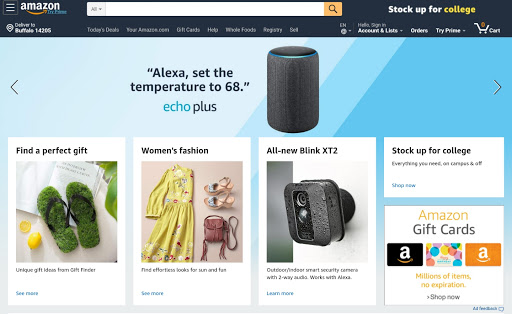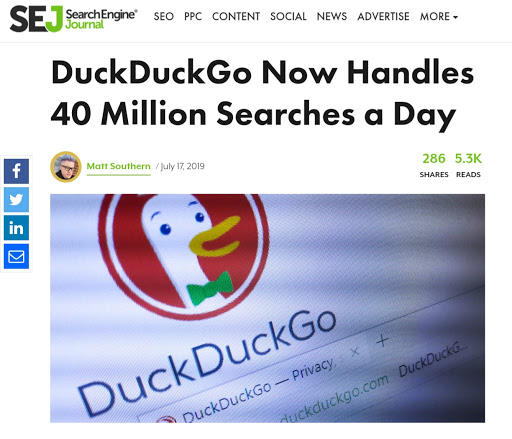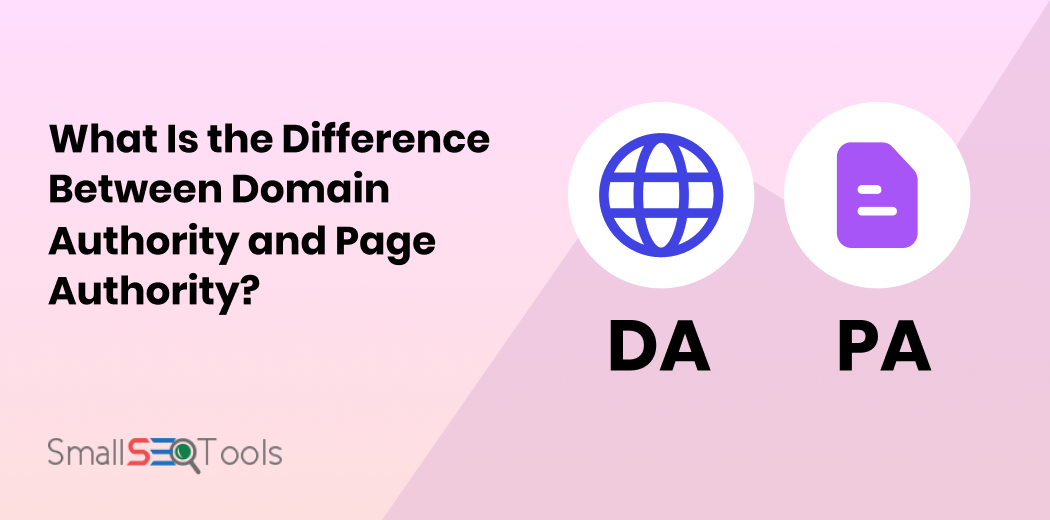Want Extra Traffic? Try These Other Search Engines

When it comes to search, it can almost feel like Google is the only player in the field. I mean, why not? Google dominates the search landscape with over 90% of the total market share.
But is Google the only search engine there is? Turns out there are over 140 search engines and directories on the Internet.
No, we aren't going to list out all these other search engines here, but we want to show you the five BEST TOP alternatives to Google, which can come in handy if you're looking for some extra search traffic. We will also look at whether or not these search engines are worth your SEO time, effort, and resources. Let's get to it!
ALTERNATIVE SEARCH ENGINES TO GOOGLE
-
Bing

Bing is perhaps the most popular Google alternative. It is owned and operated by Microsoft. Bing is a much more visually-appealing search engine than Google, as the homepage often features different beautiful nature-style photos every day.
Bing's results are often enhanced with unique, helpful info cards and graphics. And the search engine offers users the chance to earn Bing Rewards, which can be used to receive real-world gift cards and enter into sweepstakes.
Bing is the second largest search engine by market share in the US, and one of the 30 most visited sites on the Internet, according to Alexa rankings.
-
DuckDuckGo

DuckDuckGo is a search engine with a steep focus on user privacy. It empowers you to seamlessly take control of your personal information online, without any tradeoffs, but while still being able to access useful information on the web.
Recently, the New York Times reported that DuckDuckGo is now handling around 40 million searches per day. As of January 2019, DuckDuckGo was serving around 34 million searches a day.
The New York Times report reveals that DuckDuckGo is enjoying steady growth, particularly as a result of its privacy-focus approach to search. In fact, DuckDuckGo's growth has tripled over the past 24 months. An April 2019 report revealed that DuckDuckGo was the only one of Google’s alternatives gaining organic search market share in the first quarter of 2019.
-
Amazon Search

Amazon controls nearly 50 percent of the entire eCommerce market in the US alone. And its grip on a diverse range of product categories is growing even more. But Amazon is more than just an eCommerce website. It has become the go-to place for users to search for products — any type of product.
In fact, Google has stated before that their biggest search competitor is none other than Amazon… not Bing nor Yahoo!.
"Many people think our main competition is Bing or Yahoo. But, really, our biggest search competitor is Amazon. People don't think of Amazon as search, but if you are looking for something to buy, you are more often than not looking for it on Amazon," Google’s former CEO told a live audience in Berlin.
And it's true:
One data report revealed that from 2015 to 2018, Amazon surpassed Google to become the #1 product search engine. The two tech giants switched places with Amazon growing from 46% to 54% and Google declining from 54% to 46%.
If you sell or own a product (digital or physical), and want well-qualified, ready-to-convert traffic, then Amazon might be the right option for you.
Amazon’s organic product ranking algorithm is called A9. It uses both direct and indirect factors to match users’ search queries to products they are most likely to buy. Amazon’s A9 search engine is managed by Amazon’s California-based subsidiary, A9.com, which develops search engine and search advertising technology.
-
StartPage

StartPage is a Netherlands-based search engine that can pass for a true Google’s alternate.
Why so? Because it uses Google search results BUT without logging any user data nor sharing user information with third parties. So typically, if you crave Google’s search results but value your privacy and don't want your data tracked and used wrongfully, then StartPage has something to offer.
Apart from being available as a Chrome and Firefox extension, StartPage offers three unique features that stand it out:
-
Ability to hide your IP address and your location using a proxy server so that user activity is truly private
-
URL generator that completely eliminates the need for cookies
-
HTTPS support that ensures only results from trusted websites are displayed.
Additionally, StartPage offers advanced filtering option which allows users to find images and videos.
-
Yahoo! Search

According to the latest Statista records, Yahoo! had about 3.13% of the entire search market as of April 2019, next only to Bing's 4.81% and, of course, Google.

Although it's now the third-largest search engine, Yahoo has been around longer than Google. Also, apart from being just a search engine, Yahoo! offers a ton of other services, including news aggregation, online shopping information, travel directory, and much more, which are all information people look for in search.
Yahoo supports almost 40 languages and is currently the default search engine for the popular browser, Mozilla Firefox. And given that Flickr has been integrated with the search engine, users can access great image results.
-
Honorable Mentions: Yandex and Baidu
We only decided to mention these two because of the popularity they enjoy. These two are mainly geographic-based search engines: Baidu is the main search engine used in China while Yandex, on the other hand, is the most popular search engine in Russia.
According to Alexa rankings, Baidu is the fourth most visited websites globally (as at the time of writing this) after only Google.com, YouTube, and Facebook. Yandex is among the top 30 most visited sites on the Internet.
If you're looking for some extra traffic outside of the Google dominated countries (USA, UK, Canada, Nigeria, India, Pakistan, Indonesia, etc.), then Yandex and Baidu can be good options for you.
ARE NON-GOOGLE SEARCH ENGINES WORTH YOUR SEO EFFORT?
Being that Google controls the majority of the search market, is it worth investing your time, effort, and resources in these alternative search engines? Why would you want to do so? Of course, Google dominates so much of the market share that it might seem futile and unwise to even put your SEO effort on optimizing for these other search engines.

However, recent changes in the popularity of certain search engines make it worth your effort and time.
For example, we mentioned earlier that Amazon surpassed Google to become the #1 product search engine. DuckDuckGo is steadily expanding from 34 million in January this year, to 40 million searches per day in July.

Also, Internet giants like Google and Facebook have been known to violate user privacy. Google tracks every activity of users, from search history to locations, to the websites visited, and even to users online purchases.
Google claims that the data they collect helps them present more accurate or personalized results to users, which is true to some extent. But they also use the personally identifiable data of users for other things like serving personalized ads and even for more problematic things that involve privacy violations. Deep within Google’s unnecessarily elongated user agreement are lines like:
[We can “use, host, store, reproduce, modify, create derivative works […], communicate, publish, publicly perform, publicly display and distribute” any files stored on our servers."] Additionally, Google does participate in the PRISM surveillance program, which means they work closely with the government. So, it is not just Google keeping a close eye on you, but the government also. Smaller search engines such as DuckDuckGo, Search Encrypt, Qwant, StartPage, Swisscow, and Gibiru have solved the privacy issue by offering user privacy [on the search front].
This privacy consideration, which Google ignores, is what is pushing more searchers to these alternative search engines. Just for the record, when it comes to user privacy, Google alternatives Bing and Yahoo! are not innocent either. But we had to include them on the list because of their market share.
PENALIZED? STIFF COMPETITION? TRY THE ALTERNATIVES
Google may be the most popular choice in search engines, but you still have a multitude of alternatives to optimize your website for. In perspective, some of these alternative search engines provide similar if not better user experience, and so, people are actually using them.
It is worth knowing that the competition for top ranking on Google is stiffly severe. Everybody wants to rank on the first page for strategic keywords. This is not the case on other search engines, which means you can easily rank #1 for your most valuable keywords and enjoy that little extra highly-qualified, ready-to-convert traffic.
Also, if Google penalizes your website, these search engines simply mean that you have alternatives to turn to. So don't buckle yourself down. As you're optimizing for Google, remember to add that little extra effort to rank on other search engines. And in most cases, these efforts aren't so much more than just a little tweak here and there. But even simpler, Small SEO Tools provides you with all the tools you need to easily optimize your website and content for any search engine. And it's 100% free!











